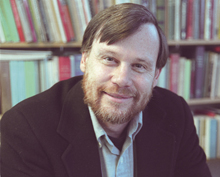Central Asia Beyond Borat
Region’s ambassadors speak on energy, history, and culture at Metcalf

Soviet rule has long ended, but democracy and stability have yet to take a firm hold in Central Asia, a region bordered roughly by Russia to the north, China to the east, Iran and Afghanistan to the south, and the Caspian Sea to the west.
Looking to shed more light on the region, the International Students Consortium brings together four Central Asian ambassadors to the United States in a Day of Understanding today, November 16, at 4 p.m. in Metcalf Hall. The event begins with a forum on energy, moderated by Thomas Barfield, a professor and chair of the anthropology department in the College of Arts and Sciences. Ambassadors Khamrokhon Zaripov of Tajikistan, Meret Orazov of Turkmenistan, Yashar Aliyev of Azerbaijan, and Zamira Sydykova of Kyrgyzstan will discuss hydroelectric power, natural gas, and petroleum, as well as business opportunities in the region. Moderating a talk on history, civilization, and culture at 6 p.m. is Shahla Haeri, a CAS associate professor and director of BU’s Women’s Studies Program. The ambassadors will also address human rights issues, democracy, and relations with Europe, the United States, Russia, and Turkey.
BU Today talked with Barfield about energy, democracy, and tourism in Central Asia.
BU Today: What are the biggest issues facing the region right now, starting with energy?
Barfield: The major problems relate to those countries that have energy and want to export it and those that don’t. Tajikistan could be a major exporter of electricity, but it needs to put lines south through Afghanistan into South Asia. Those don’t exist yet. Turkmenistan has huge oil and gas reserves, but so far has limited distribution. Kazakhstan is the major oil producer and has signed agreements with the West as well as with China, so it’s doing very well. But countries like Kyrgyzstan have no particular resources, and Uzbekistan is a consuming country as opposed to a producing one.
Might the United States turn to Turkmenistan, for example, as we try to wean ourselves from Middle Eastern oil?
The U.S. is already in that region, across the Caspian Sea. It’s a major investor in Azerbaijan, which is in this region. Turkmenistan is on the other side of the Caspian, but at the moment there’s no way to get Turkmen gas. The government there is not an easy one to deal with. But there has been a very large amount of American and Western investment in Kazakhstan already.
How do human rights and democracy fare in Central Asia?
Human rights are problematic. Uzbekistan engaged in a violent repression of a demonstration in a place called Andijon in the Ferghana Valley. [The European Union then blocked Uzbek officials] from even traveling to the West, and as a response to that, [President Islam Karimov] threw the American air base out of Uzbekistan. We had a fairly close relationship after 2001. That soured. They were moving away from Russia; now they’re back again. But they have a very bad record. Turkmenistan is a totalitarian state, ruled by its leader, who pretty much determines everything that goes on there. None of the countries are what we would consider a democracy. Kyrgyzstan, which came the closest, has undergone a couple of revolutions recently. We do have an air base in Kyrgyzstan, and they have closer relationships with the West. Tajikistan had a civil war and has basically been stable for the past 10 years. They just had a presidential election that went off peacefully. Nobody considers it an example of a democratic process, but on the other hand they don’t have a civil war. One of the problems is that all of these leaders came out of the Soviet system. They’re nationalists instead of socialists, but it’s a problem in terms of them giving up power — they want to hold on to it.
Does the region keep closer ties to Russia than to the West?
Russia borders the region and there are a lot of Russians who live in Kazakhstan. They were closer to the West, but then, they don’t like being criticized, either. And one of the things the Russians don’t really do is criticize them. Also there are some cultural links. The Soviet Union was there for so long that Russian is still largely the lingua franca, so that gives the Russians an advantage in terms of dealing with people. Russian is still the main second language there, and most of the elite is Russian-speaking.
Do you think the movie Borat will inhibit American understanding of the region? Or are there kernels of truth in it?
No, in terms of Kazakhstan, there’s no kernel of truth at all in Borat! And I’m sure all the other Central Asian states are relieved because he [Sacha Baron Cohen] could have presumably picked any stan he wanted. It certainly gives them name recognition, but it’s an embarrassing kind. If this had been 40 years ago, he would have picked some place in Eastern Europe. But remember, his film is mostly making fun of the United States. The problem is that most Americans know nothing about Central Asia. The Kazaks have overreacted, probably, but they’re not used to this kind of thing.
How about tourism in Central Asia? Are there any sites with potential?
Uzbekistan has a number of sites. There’s Samarkand and Bukhara, very famous Central Asian cities. The Russians did a lot of restoration work, particularly in Uzbekistan. It’s very difficult to travel to Turkmenistan at all. Kyrgyzstan doesn’t have so many historic sites, but they do have ecotourism and a place called Lake Issyk-Kul. Kyrgyzstan’s got a lot of nomads and yurts, and the Pamir Mountains are attractive.
Patrick Kennedy can be reached at plk@bu.edu.